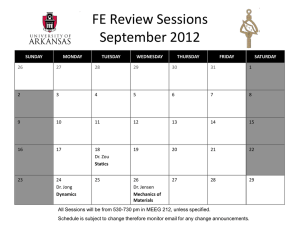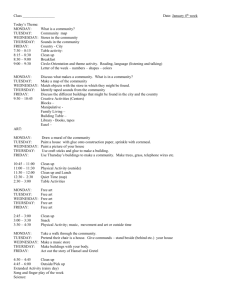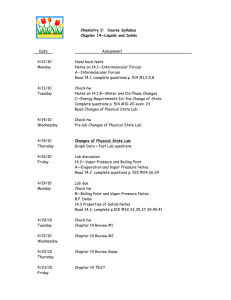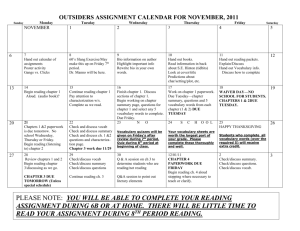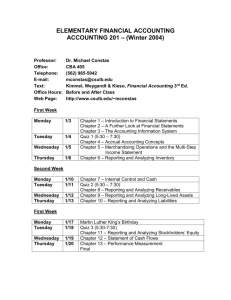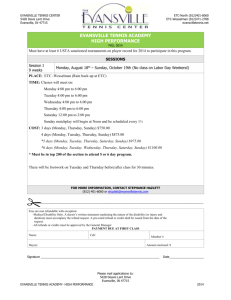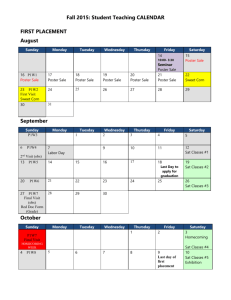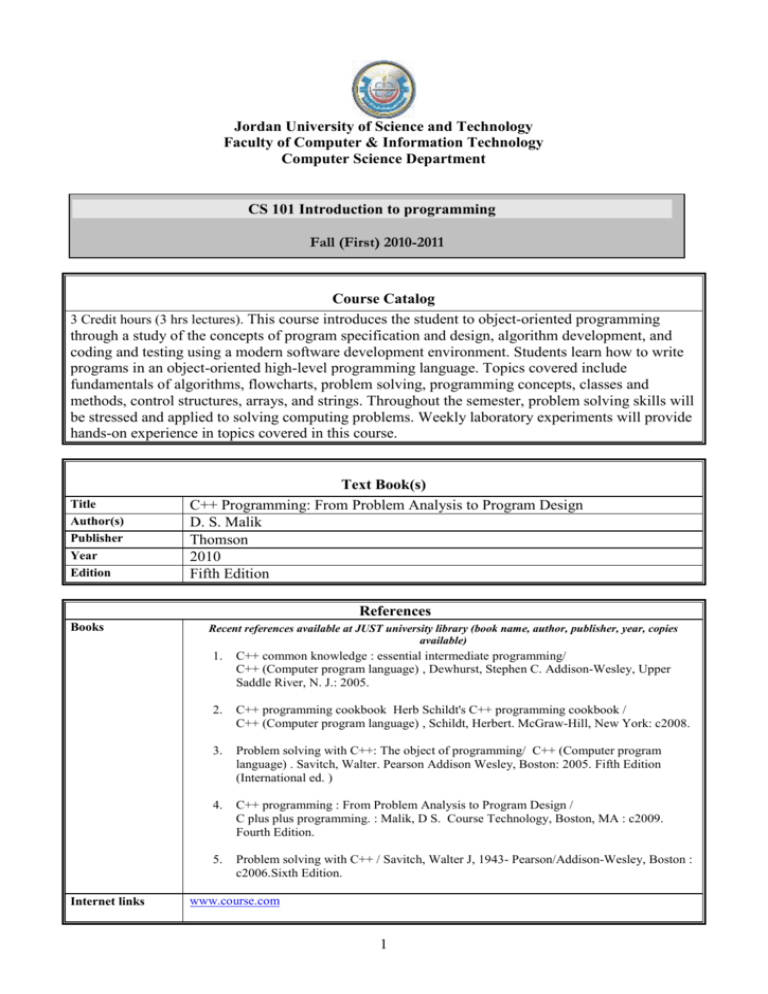
Jordan University of Science and Technology
Faculty of Computer & Information Technology
Computer Science Department
CS 101 Introduction to programming
Fall (First) 2010-2011
Course Catalog
3 Credit hours (3 hrs lectures). This course introduces the student to object-oriented programming
through a study of the concepts of program specification and design, algorithm development, and
coding and testing using a modern software development environment. Students learn how to write
programs in an object-oriented high-level programming language. Topics covered include
fundamentals of algorithms, flowcharts, problem solving, programming concepts, classes and
methods, control structures, arrays, and strings. Throughout the semester, problem solving skills will
be stressed and applied to solving computing problems. Weekly laboratory experiments will provide
hands-on experience in topics covered in this course.
Title
Author(s)
Publisher
Year
Edition
Text Book(s)
C++ Programming: From Problem Analysis to Program Design
D. S. Malik
Thomson
2010
Fifth Edition
References
Books
Internet links
Recent references available at JUST university library (book name, author, publisher, year, copies
available)
1.
C++ common knowledge : essential intermediate programming/
C++ (Computer program language) , Dewhurst, Stephen C. Addison-Wesley, Upper
Saddle River, N. J.: 2005.
2.
C++ programming cookbook Herb Schildt's C++ programming cookbook /
C++ (Computer program language) , Schildt, Herbert. McGraw-Hill, New York: c2008.
3.
Problem solving with C++: The object of programming/ C++ (Computer program
language) . Savitch, Walter. Pearson Addison Wesley, Boston: 2005. Fifth Edition
(International ed. )
4.
C++ programming : From Problem Analysis to Program Design /
C plus plus programming. : Malik, D S. Course Technology, Boston, MA : c2009.
Fourth Edition.
5.
Problem solving with C++ / Savitch, Walter J, 1943- Pearson/Addison-Wesley, Boston :
c2006.Sixth Edition.
www.course.com
1
Instructors
Instructor
Dr Ayad Salhieh, Dr Mohammed AlHammori, Dr Yaser Khamayseh, Noor Zaghal,
Rasha Obeidat, Malak Abdullah, Qanita BaniBaker, Mohammed AlWedyan.
Office Location
Medical building,: Ph4 Level 0, Ph4 Level -1, D2 Level 0, Ph1 Level 1, Ph2 Level 1,
Ph1 Level 0.
Office Phone
720-1000 ext: -
E-mail
salhieh@just.edu.jo , msalhammouri@just.edu.jo, yaser@just.edu.jo,
noorzaghal@just.edu.jo, rmobeidat@just.edu.jo, mabdullah@just.edu.jo,
qmbanibanker@just.edu.jo, mowedyan@just.edu.jo
Class Schedule & Room
Section 1:
Lecture Time: Sunday, Tuesday, Thursday
Room: Ph2 106
8:15-9:15
Section 2:
Lecture Time: Sunday, Tuesday, Thursday
Room: Ph2 104
8:15-9:15
Section 3:
Lecture Time: Sunday, Tuesday, Thursday
Room: A2 122
10:15-11:15
Section 4:
Lecture Time: Sunday, Tuesday, Thursday
Room: Ph2 106
12:15-1:15
Section 5:
Lecture Time: Sunday, Tuesday, Thursday
Room: A3 128
2:15-3:15
Section 6:
Lecture Time: Monday, Wednesday
Room: A2 122
8:15-9:45
Section 7:
Lecture Time: Monday, Wednesday
Room: C3 014
12:45-2:15
Section 8:
Lecture Time: Monday, Wednesday
Room: PH2 101
12:45-2:15
Section 9:
Lecture Time: Monday, Wednesday
Room: PH2 102
12:45-2:15
Section 10:
Lecture Time: Monday, Wednesday
Room: PH2 102
2:15-3:45
Section 11:
Lecture Time: Sunday, Tuesday, Thursday
Room: Lab 9
9:15-10:15
2
Section 12:
Lecture Time: Sunday, Tuesday, Thursday 9:15-10:15
Room: Lab 11
Section 13:
Lecture Time: Monday, Wednesday
Room: Lab 9
9:45-11:15
Section 14:
Lecture Time: Sunday, Tuesday, Thursday 1:15-2:15
Room: Lab 7
Office Hours
Dr Ayad Salhieh:
9:15 – 10:15
11:15 – 12:15
Sunday, Tuesday, Thursday
Monday, Wednesday
Dr Mohammed AlHammori: Sunday, Tuesday, Thursday
Monday, Wednesday
Dr Yaser Khamayseh:
Sunday, Tuesday, Thursday
Monday, Wednesday
Miss. Noor Zaghal:
Sunday, Tuesday, Thursday
Monday, Wednesday
Mrs Rasha Obeidat:
Sunday, Tuesday, Thursday
Monday, Wednesday
Miss Malak Abdullah:
Sunday, Tuesday, Thursday
Monday, Wednesday
Miss Qanita BaniBaker:
Sunday, Tuesday, Thursday
Monday, Wednesday
11:15 -12:15
11:15-12:30
Mr Mohammed AlWedyan: Sunday, Tuesday, Thursday
Monday, Wednesday
3
Teaching Assistant
Miss. Hiba AlMasri
Mr. Raed Allouh
Miss. Doa'a Tashtoush
Miss. Fadia Bani Younis
Sections:()
Sections:()
Sections:()
Sections:()
Prerequisites
CIS100 Computer Skills or concurrent
Prerequisites by course
Topics Covered
Topics
An Overview of Computers and Programming Languages
Basic Elements of C++
Control Structures I (Selection)
Control Structures II (Repetition)
User-Defined Functions I
User-Defined Functions II
Namespaces, the class string, and User-Defined Simple Data Types.
Arrays
Chapters in Text
Chapter 1
Chapter 2
Chapter 4
Chapter 5
Chapter 6
Chapter 7
Chapter 8
Chapter 9
Week number
1
2,3
4,5
5,6,7
8,9,10
11,12,13
13,14
14,15
Mapping of Course Objectives to Program Outcomes1
Assessment
method
1.
The student will identify the hardware components of a computer and will describe how
they act together to form a complete system including the scientific principles on which
they are based. [B,C]
Quizzes, Exams
2.
The student will edit, compile, execute and get hard copy of a simple program. [B]
Quizzes, Exams
3.
Quizzes, Exams
8.
The student will use good documentation, formatting and naming conventions to insure
program readability. [A, B, C]
The student will write a program using the C++ arithmetic operators, input/output
methods and appropriate manipulators for formatting. [A, B, C]
The student will write a program using appropriate selection statements such as if, ifelse and switch. [A, B, C]
The student will write a program using appropriate looping statements such as while, for
and do-while. [A, B, C]
The student will write a program using functions with parameters passed by value and
by reference. [A, B, C]
The student will create his own data type (enumeration data type). [A, B, C]
9.
The student will use both one dimensional and multi-dimensional arrays. [A, B, C]
Quizzes, Exams
4.
5.
6.
7.
Quizzes, Exams
Quizzes, Exams
Quizzes, Exams
Quizzes, Exams
Quizzes, Exams
10. The student will use character data and string processing. [A, B, C]
Quizzes, Exams
Relationship to Program Outcomes (score out of 5)
A
B
C
4
5
4
D
E
F
G
H
I
J
K
L
Relationship to Program Objectives
1
2
3
1
4
5
Upper-case letters in brackets refer to the Program outcomes
4
Evaluation
Assessment Tool
Quizzes
First Exam
Second Exam
Final Exam
Expected Due Date
Weekly
Thursday October 28th, 2010
Sunday November 28th, 2010
According to the University final examination schedule
Weight
15 %
20 %
25 %
40 %
Policy
Attendance
Exams
Attendance is very important for the course. In accordance with university policy, students
missing more than 10% of total classes are subject to failure. Penalties may be assessed
without regard to the student's performance. Attendance will be recorded at the beginning or
end of each class.
All exams will be CLOSE-BOOK; necessary algorithms/equations/relations will be supplied as
convenient.
Prepared by: Dr Ayad Salhieh and Miss Noor Zaghal
5
Last Modified: September 19, 2010

